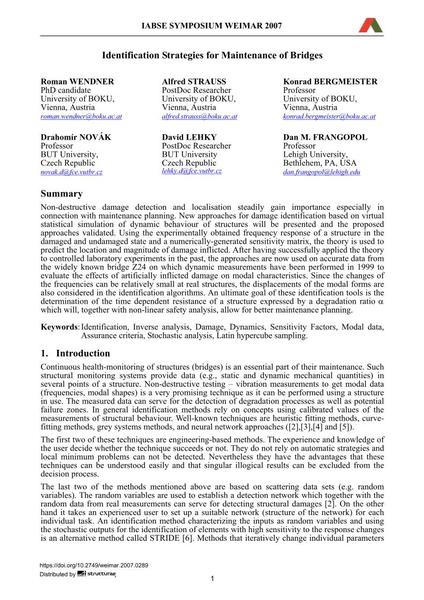Identification Strategies for Maintenance of Bridges

|
|
|||||||||||
Détails bibliographiques
| Auteur(s): |
Roman Wendner
Alfred Strauss Konrad Bergmeister Dahomír Novák David Lehký Dan M. Frangopol |
||||
|---|---|---|---|---|---|
| Médium: | papier de conférence | ||||
| Langue(s): | anglais | ||||
| Conférence: | IABSE Symposium: Improving Infrastructure Worldwide, Weimar, Germany, 19-21 September 2007 | ||||
| Publié dans: | IABSE Symposium Weimar 2007 | ||||
|
|||||
| Page(s): | 570-571 | ||||
| Nombre total de pages (du PDF): | 8 | ||||
| Année: | 2007 | ||||
| DOI: | 10.2749/weimar.2007.0289 | ||||
| Abstrait: |
Non-destructive damage detection and localisation steadily gain importance especially in connection with maintenance planning. New approaches for damage identification based on virtual statistical simulation of dynamic behaviour of structures will be presented and the proposed approaches validated. Using the experimentally obtained frequency response of a structure in the damaged and undamaged state and a numerically-generated sensitivity matrix, the theory is used to predict the location and magnitude of damage inflicted. After having successfully applied the theory to controlled laboratory experiments in the past, the approaches are now used on accurate data from the widely known bridge Z24 on which dynamic measurements have been performed in 1999 to evaluate the effects of artificially inflicted damage on modal characteristics. Since the changes of the frequencies can be relatively small at real structures, the displacements of the modal forms are also considered in the identification algorithms. An ultimate goal of these identification tools is the determination of the time dependent resistance of a structure expressed by a degradation ratio α which will, together with non-linear safety analysis, allow for better maintenance planning. |
||||
